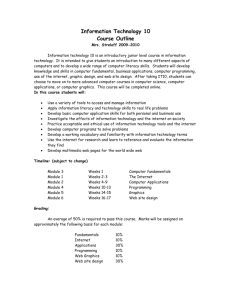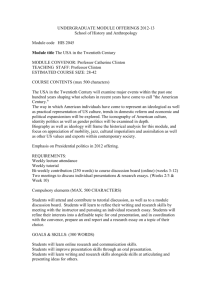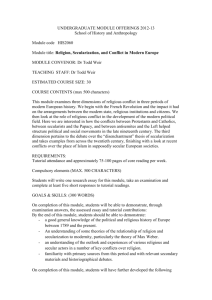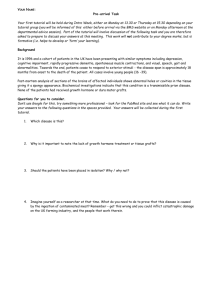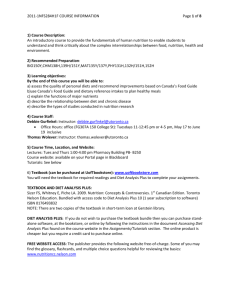2014-1 NFS284H1S Basic Human Nutrition Course Syllabus
advertisement
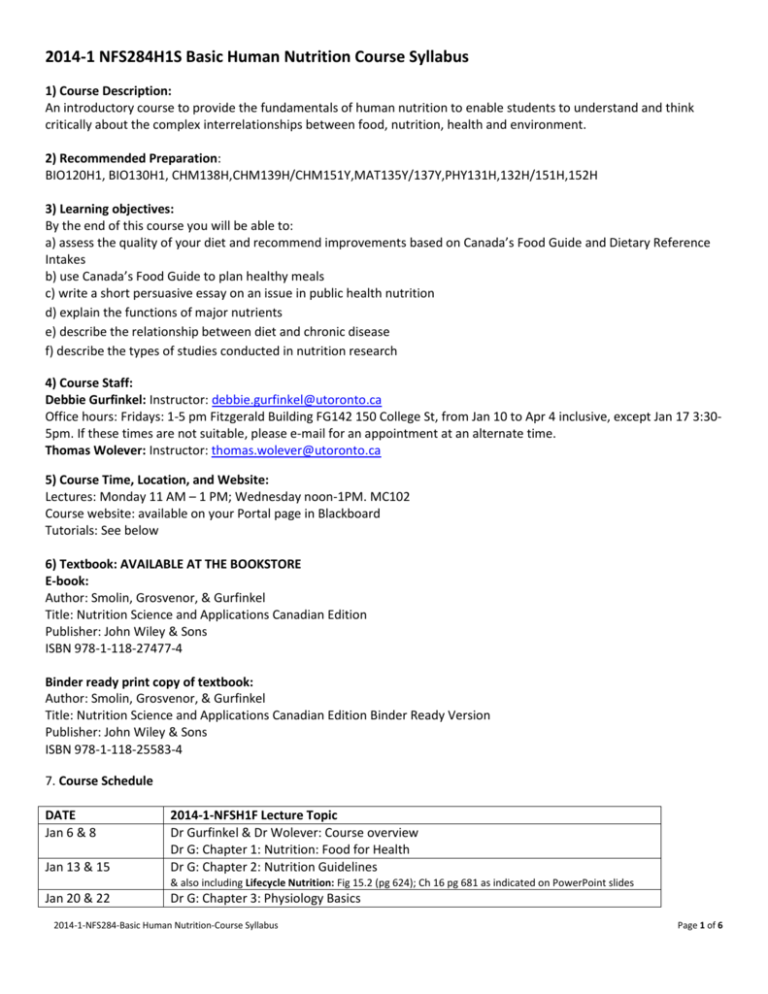
2014-1 NFS284H1S Basic Human Nutrition Course Syllabus 1) Course Description: An introductory course to provide the fundamentals of human nutrition to enable students to understand and think critically about the complex interrelationships between food, nutrition, health and environment. 2) Recommended Preparation: BIO120H1, BIO130H1, CHM138H,CHM139H/CHM151Y,MAT135Y/137Y,PHY131H,132H/151H,152H 3) Learning objectives: By the end of this course you will be able to: a) assess the quality of your diet and recommend improvements based on Canada’s Food Guide and Dietary Reference Intakes b) use Canada’s Food Guide to plan healthy meals c) write a short persuasive essay on an issue in public health nutrition d) explain the functions of major nutrients e) describe the relationship between diet and chronic disease f) describe the types of studies conducted in nutrition research 4) Course Staff: Debbie Gurfinkel: Instructor: debbie.gurfinkel@utoronto.ca Office hours: Fridays: 1-5 pm Fitzgerald Building FG142 150 College St, from Jan 10 to Apr 4 inclusive, except Jan 17 3:305pm. If these times are not suitable, please e-mail for an appointment at an alternate time. Thomas Wolever: Instructor: thomas.wolever@utoronto.ca 5) Course Time, Location, and Website: Lectures: Monday 11 AM – 1 PM; Wednesday noon-1PM. MC102 Course website: available on your Portal page in Blackboard Tutorials: See below 6) Textbook: AVAILABLE AT THE BOOKSTORE E-book: Author: Smolin, Grosvenor, & Gurfinkel Title: Nutrition Science and Applications Canadian Edition Publisher: John Wiley & Sons ISBN 978-1-118-27477-4 Binder ready print copy of textbook: Author: Smolin, Grosvenor, & Gurfinkel Title: Nutrition Science and Applications Canadian Edition Binder Ready Version Publisher: John Wiley & Sons ISBN 978-1-118-25583-4 7. Course Schedule DATE Jan 6 & 8 Jan 13 & 15 2014-1-NFSH1F Lecture Topic Dr Gurfinkel & Dr Wolever: Course overview Dr G: Chapter 1: Nutrition: Food for Health Dr G: Chapter 2: Nutrition Guidelines & also including Lifecycle Nutrition: Fig 15.2 (pg 624); Ch 16 pg 681 as indicated on PowerPoint slides Jan 20 & 22 Dr G: Chapter 3: Physiology Basics 2014-1-NFS284-Basic Human Nutrition-Course Syllabus Page 1 of 6 and also including Lifecycle Nutrition: pg 611-612 as indicated on PowerPoint slides Jan 27 & 29 TUTORIAL #1: Jan 21, 22,23, 24 Jan 27: TERM TEST 1 Jan 29: Dr Wolever: Chapter 4: Carbohydrates & also Including F2.1: Obesity and type-2-diabetes pg 312-315 & Lifecycle Nutrition: Section 14.1: Gestational Diabetes Mellitus pg 588 Feb 3 & 5 TUTORIAL #2: Jan 28, 29, 30, 31 Draft essay due SCIENCE WRITING QUIZ: Due online Jan 31 at 6:00pm. Dr Wolever: Chapter 4: Carbohydrates & also including F2.2: Obesity and cardiovascular disease pg 315-317 Focus on Alcohol: pg 212-220 & also including Lifecycle Nutrition: Section 14.3: Alcohol: pg 601 & 602 Feb 10 & 12 Feb 17 & 19 Feb 24 & 26 Dr Wolever: Chapter 5: Lipids TUTORIAL #3: Feb 11, 12, 13, 14 Final essay due READING WEEK –no classes Dr Wolever: Chapter 5: Lipids & Chapter 6: Protein & also including Section 15.5 Vegetarian Diets pg 649 Mar 3 & 5 TUTORIAL #4: Feb 25, 26, 27, 28 Mar 3: Dr. Wolever: TERM TEST 2 Mar 5: Dr Gurfinkel: Natural Health Products Section 2.5 Food & Natural Health Product Labels pg 71; Section 8.1 Your Choice: Natural Health Products in Food Format pg 327; Focus on Non-vitamin/mineral supplements pg 474-483. Mar 10 & 12 Dr G: Chapter 7: Energy Balance Weight Management Chapter 13: Nutrition and Physical Activity Dr G: Ch 14, 15, 16: Weight Management through the Lifecycle: Parts of ch 14, 15, & 16 as indicated on PowerPoint slides Mar 17 & 19 TUTORIAL #5: Mar 11, 12, 13, 14 Three-day food record due Mar 17: Guest lecturer: Dr Debbie O’Connor-Careers in Dietetics (approx. 30 minutes) Dr G: Chapter 8: Water-soluble Vitamins Dr G: Chapter 9: Fat-soluble vitamins & also including Lifecycle Nutrition: parts of ch14, 14 & 16 as indicated on PowerPoint slides Mar 24 & 26 FOOD INTAKE SURVEY: Due online March 21 at 3 pm Dr G: Chapter 10: Water & Electrolytes Chapter 11 Major Minerals and Bone health Chapter 12: Minor Minerals & also including Lifecycle Nutrition: Parts of ch 14, 15, 16 as indicated on PowerPoint slides Mar 31 & Apr 2 TUTORIAL #6: Mar 25, 26, 27, & 28 Dr G: Focus on Integrating Nutrient Function Dr Wolever: Results of the food intake survey FOOD SAFETY QUIZ (online open-book MC quiz based on chapter 17): Due online Apr 4 at 3:00pm 8. Required readings During lectures required readings from various sections of the textbook will be assigned. These topics will NOT be discussed in class. Instead students will be expected to study the topics independently and the term test and final exam will include questions on these readings. A file listing all required readings is posted in Lecture Documents. 9. Assessment: Assignment Term Test 1 (MCQ) Due date Jan 27-all of Dr G’s material to date 2014-1-NFS284-Basic Human Nutrition-Course Syllabus Weight (%) 20 Page 2 of 6 Science Writing Quiz-online Draft Essay Final Essay Draft essay revision check list Term Test 2 (MCQ) Three-day food record Food Intake Survey Food Safety Quiz Final Exam (MCQ) Jan 31-online at 3 pm TUTORIAL #2: Jan 28, 29, 30, 31 TUTORIAL #3: Feb 11, 12, 13, 14 TUTORIAL #3: Feb 11, 12, 13, 14 Mar 3-all of Dr Wolever’s material to date TUTORIAL #5: Mar 11, 12, 13, 14 Three-day food record due Due online March 21 at 3 pm Due online Apr 4 at 3:00pm April Exam Period -10% term test 1 material; 10% term test 2 material; 80% remaining course material Total 1 1 12 1 20 8 1 1 35 100 10. Tutorial Schedule & Location: All tutorials are in FG129. The purpose of the tutorials is to assist students with assignments. Note: Slides for tutorials #1, 2, 5 are posted on the Blackboard course website: See link: Assignments/Tutorials Prepare for tutorials by reading the assignment handouts and the tutorial documents prior to the tutorial. Tutorial Date Topics Jan 21, 22, 23, 24 TUTORIAL #1: Short essay: discussion of writing samples Jan 28, 29, 30, 31 TUTORIAL #2: How to complete a 3-day food record Draft essay due at the beginning of the tutorial in which you are registered Feb 11, 12, 13, 14 TUTORIAL #3: Final essay and draft essay revision check list due at the beginning of the tutorial in which you are registered Feb 25, 26, 27, 28 TUTORIAL #4: Short tutorial: 20-30 minutes Essay returned Mar 11, 12, 13, 14 TUTORIAL #5: Assessing food intake ***there will be one MC question on the final exam on this topic*** Three day food record due at the beginning of the tutorial in which you are registered Mar 25, 26, 27, 28 TUTORIAL #6: Short tutorial: 20-30 minutes Three-day food record returned 12) Important course policies a) Electronic communication with instructors and TAs: Questions about course content : There are two discussion boards that you can access in this course. One is the lecture discussion board where Dr Gurfinkel and Dr Wolever regularly respond to questions about the lecture material. There is a second discussion board that will be managed by your TA for questions about your assignments. Questions of a more personal nature: Please limit the use of e-mail to personal matters only. If you send questions about lecture content via email, you will be asked to post the questions on the discussion board. Be sure to include the course code NFS284 in the subject line of any e-mail communication. If corresponding about a matter related to your tutorial, be sure to include your TAs name or tutorial section number in the text. Note also that instructors have office hours where you can discuss both lecture material and personal matters. 2014-1-NFS284-Basic Human Nutrition-Course Syllabus Page 3 of 6 Student e-mail accounts: All U of T students are required to have a valid UofT email address. You are responsible for ensuring that your UofT e-mail address is set up and properly entered in ROSI. Otherwise you will NOT be able to receive emails from your instructor as @mail.utoronto.ca addresses are the only addresses used by Blackboard. You are also responsible for checking your U of T email account on a regular basis. Failure to do so is not an acceptable excuse for missing important messages. Class-wide mailings: Occasionally instructors will send a mass mailing to all students via Blackboard. Forwarding your @mail.utoronto.ca to a hotmail, Gmail, yahoo account etc is NOT advisable. In some cases, these mailings may be interpreted as spam and be rejected or diverted to your junk mail folder. This could result in you missing an important message. Check your @mail.utoronto.ca account directly from the U of T website. Announcements: Announcements are posted on the course website and it is the student’s responsibility to check there regularly. These announcements include reminders of important dates that most students find helpful. b) Assignments and Turnitin policy: Students are expected to independently work on their assignments and properly paraphrase and cite sources used for their assignments. The Science Writing Quiz is intended to provide all students with an understanding of how to use scientific sources in their writing and how to avoid plagiarism. Be sure that you understand what plagiarism is. It is a serious offence. In this course, Turnitin will be used as a plagiarism prevention tool as described below: “Normally, students will be required to submit their course essays to Turnitin.com for a review of textual similarity and detection of possible plagiarism. In doing so, students will allow their essays to be included as source documents in the Turnitin.com reference database, where they will be used solely for the purpose of detecting plagiarism. The terms that apply to the University's use of the Turnitin.com service are described on the Turnitin.com web site”. For this course, students will be asked to submit two assignments: 1) the final essay and 2) the three day food record to Turnitin. Assignments are submitted through a direct link to Turnitin that is found on the course’s Blackboard page. If you have problems that prevent you from submitting to Turnitin, please contact Dr.Gurfinkel to discuss alternatives. All students are expected to submit to Turnitin, which is voluntary, or provide an alternative. Failure to do so could result in a grade of ZERO for the assignment. For those who do not submit to Turnitin, as an alternative you will be expected to meet with Dr Gurfinkel for a short oral test during which you will be asked questions about the process of writing of the assignment and your knowledge of the content of the assignment. Your assignment mark may be modified based on how well you answer these questions. Dr. Gurfinkel reviews the Turnitin submissions and will e-mail students if there are any concerns about their writing. Often this is no more than a discussion of how to properly paraphrase and/or cite references, but the deduction of marks may also result. Failure to respond to such an e-mail will result in the deduction of assignment marks. If a serious case of plagiarism is suspected, the student’s assignment will be forwarded to the Office of Academic Integrity for review and possible sanction. c) Policy regarding late assignments: A HARD COPY of each assignment is due at the beginning of the tutorial in which you are registered. If you miss your scheduled tutorial, assignments will be accepted after your tutorial, up to 4:45 pm on the due date, but there will be a 10% penalty (e.g. Initial grade 85% - 10% penalty = Final grade75%) and you must follow the procedure below: 1) Have your assignment stamped “received” and marked with date AND time in the main office of the Department of Nutritional Sciences (FG 316, 150 College, hours: 9am-4:45 pm) and then 2) E-mail your TA, the SAME day, so he/she knows your assignment is available in FG316. 2014-1-NFS284-Basic Human Nutrition-Course Syllabus Page 4 of 6 Note: The hard copy of your assignment is the only version which will be graded. Submitting your assignment to Turnitin or by e-mail as “proof” of its timely completion is NOT acceptable; timely completion includes the budgeting of travel time to ensure you can submit your hard copy. After the due date: NO ASSIGNMENT WILL BE ACCEPTED after the due date except for compelling reasons such as illness or personal distress. Please contact Dr Gurfinkel by e-mail (debbie.gurfinkel@utoronto.ca) to request an extension. You will be asked to provide a reason for the request. This can be a written explanation from you or a verification of illness or injury form: http://www.illnessverification.utoronto.ca/getattachment/index/Verification-of-Illness-or-Injury-form-Jan-222013.pdf.aspx . If you prefer, verbal explanations will also be accepted. See Dr Gurfinkel during her office hours Fridays 1-5 pm (FG142-150 College St) or phone 416-978-3621. All discussions are kept confidential. Students dealing with intense or ongoing personal distress or chronic illness, who may need special and continuing accommodation, may be asked for additional documentation and are advised to discuss their situation with their college registrar. Please note that poor time management, having several assignments due at the same time, having to study for term tests, etc are NOT compelling reasons for an extension. Students are expected to complete their assignments as best they can, hand them in on time, even if incomplete, and accept that they may not get as high a grade as they would like. If you are uncertain if you have compelling reasons for an extension or if you are unable to contact Dr. Gurfinkel for an extension prior to the due date, then you should: 1) FIRST hand in as much of the assignment as you possibly can on the due date and THEN 2) Make an appointment to meet with Dr Gurfinkel (debbie.gurfinkel@utoronto.ca) to discuss your situation. IMPORTANT: Often students don’t believe their situation is compelling, when in fact, it is, so please speak to Dr. Gurfinkel, whatever your circumstances. d) Policy regarding assignment re-reads: The procedure for the re-reading of course assignments is described on the marking rubrics of the respective assignment handouts. Please read them carefully as there are submission deadlines. e) Policy regarding missed term test: Except for compelling reasons, such as illness or personal distress, all students will be given a grade of ZERO if they miss the term test. There are NO MAKE-UPS. If you miss one term test (worth 20%), for compelling reasons, your final exam will be worth 55% of your final grade (20% + 35%). If you miss both term tests your final exam will be worth 75% of your final grade (20% + 20% + 35%). You are required to provide an explanation for your absence. This can be a written explanation from you or a medical certificate http://www.illnessverification.utoronto.ca/getattachment/index/Verification-of-Illness-or-Injury-form-Jan-222013.pdf.aspx . If you prefer, verbal explanations will also be accepted. See Dr Gurfinkel during her office hours Fri 1-5 pm (FG142-150 College St) or phone 416-978-3621. All discussions are kept confidential. Students dealing with intense or ongoing personal distress or chronic illness, who may need special and continuing accommodation, may be asked for additional documentation and are advised to discuss their situation with their college registrar. f) Policy regarding missed final exam: Policy regarding missed final exam is determined by the Faculty of Arts and Science. If you have compelling reasons for missing your final exam, contact your college registrar to file a petition; do this quickly as there are deadlines. You must provide documentation to support your petition. If your petition is accepted you will be permitted to write a deferred exam. A deferred exam fee (approx $70) must be paid. Note: Students loose access to courses on Blackboard about 90 days after the last day of classes, so be sure you have downloaded all documents you need to study from the course website before then. g) Lecture material, audio recordings, and intellectual property: Please note that the lecture presentations and course materials are the intellectual property of the instructor. The 2014-1-NFS284-Basic Human Nutrition-Course Syllabus Page 5 of 6 distribution, transmission, reproduction or re-posting of the NFS284 lecture materials, including audio recordings, in whole or part, is NOT permitted without the consent of the instructor. All students enrolled in NFS284 are permitted to use the material for personal use and study. You may also make audio recordings of the lecture for personal use, but if you bring a recording device to the front of the classroom, you do so at your own risk. These devices do get lost or stolen. A forum has been set up on the course discussion board called Lecture Recordings and students who are willing to share their audio recordings with their classmates can post audio files there. Students are NOT permitted to post these audio files in any other public location without the permission of Dr Wolever and Dr Gurfinkel. 13) Academic Integrity: Student are expected to conduct themselves with academic integrity. The Code of Behaviour clearly describes activities that are considered academic misconduct : http://www.governingcouncil.utoronto.ca/policies/behaveac.htm Students are urged to review the code periodically as ignorance of the rules is not an acceptable excuse. 14) How to be successful in NFS284: 1) Powerpoint slides are posted prior to the lectures. Download and read/skim through the slides and relevant chapters in the book prior to class. As little as 15 minutes spent on this “preview” will enhance your ability to follow and understand the lecture. 2) COME TO CLASS!! 3) A substantial amount of the course is based on the textbook so use it as a supporting reference to assist in your comprehension of the material. 4) Please note that the term test and final exam are based on the required readings and material discussed in lectures. You are NOT responsible for material in the textbook that is not covered in the required readings or lectures. 5) Check out the documents posted in the study skills section on the course website. 6) Keep up-to-date on the required readings. It is easy to fall behind. 7) Start working on assignments early- they take longer to complete than most students estimate. 8) Do NOT forget the 3 online quizzes – they are worth 1% each. 9) In order to be successful on tests or exams, you must be able to both comprehend the material and recall it. Review your notes, for comprehension, regularly and use the discussion board to post questions about anything you don’t understand or visit instructors during office hours to ask questions. If you have been reviewing the material during the term for comprehension, you can focus on recall in the days immediately before the exam. Be sure to give yourself enough time. Depending on the subject, you may need 1-2 hours (maybe even more for very dense material) of study/lecture hour of content. Become aware of how long it takes you to learn things so you can plan realistically. The last day before a test or exam should ideally be for review only. Finally, during an exam, persevere; don’t give in to the stress. 10) Know your TA’s name. 15) After NFS284: NFS284 is a required prerequisite for all higher level NFS courses (except NFS386: Food Chemistry for which you only require CHM 138 or equivalent). We hope that you will enjoy NFS284, read about these other courses in the calendar, and consider taking additional NFS courses in the future. 16) Accessibility Needs: The University of Toronto is committed to accessibility. If you require accommodations for a disability, or have any accessibility concerns about the course, the classroom or course materials, please contact Accessibility Services as soon as possible: http://www.accessibility.utoronto.ca/ 2014-1-NFS284-Basic Human Nutrition-Course Syllabus Page 6 of 6

